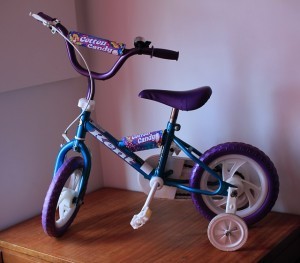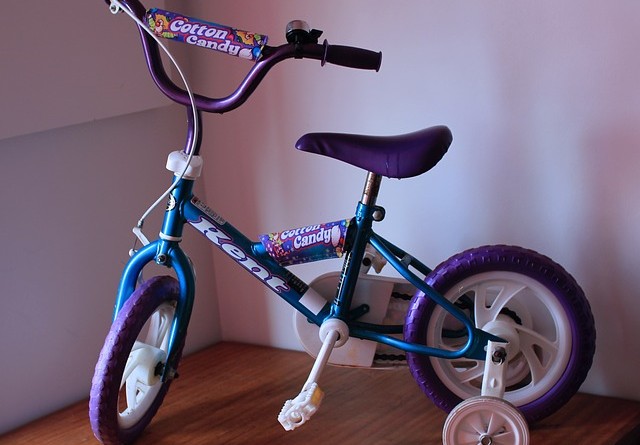Goodbye to Training Wheels; How I Got Diagnosis & Bipolar Treatment Despite Stigma
Continuing WEGO’s National Health Blog Post Month, I am answering this question: Training Wheels: Write about a time your health condition forced you to grow up and take the training wheels off (so to speak).

(I meant to write this yesterday as promised. But as I was writing it, last night’s Scandal episode scared me right into next week.) Today I’m writing about how I discovered I have bipolar disorder. Fighting Bipolar II later helped me survive Polycystic Ovarian Syndrome and Myasthenia Gravis (my neuromuscular autoimmune disease).
Flashes of Grey in a Cotton Candy Childhood
I had a very happy childhood. I grew up surrounded by the warmth of faith and family (I’m very close to my many cousins). Yet there were brief moments when I would feel depressed for no reason at all—I call them “flashes of grey in an otherwise cotton candy childhood.” My earliest memory being depressed was when I was 8-years old and I found myself questioning what the point of life was. However, moments of emptiness were few and far between. Then later in my teen years, they became more frequent and lasted hours or weeks at a time. During depression, I found it hard to concentrate. By contrast, when I was feeling “normal,” I could work on a homework assignment for ten hours straight and enjoy it. As a teenager, I repeatedly asked the adults in my life for help but faced stigma. Sadly, a lot of young people suffering from mental illness are told it’s “just teenage angst.” Since I did well in school, my parents thought I couldn’t really be depressed.
My Turning Point
My epiphany came when I was a freshman in college and a friend from back home, “D,” completed suicide. A soul-crushing depression ensued for the next week. Lying in bed, I realized that I could have bipolar disorder, an illness D was diagnosed with. I suddenly knew why we understood each other’s emptiness so well. I researched the illness online and saw I had half the symptoms including: depression and crying spells for no reason, nights where it took me five hours to fall asleep (caused by hypomania, which is when people with Bipolar II feel “high”), and an unpredictable pattern. I never knew when I would feel depressed, normal, or hypomanic. After a week in bed, I mustered up the strength to see the campus psychiatrist who diagnosed me with bipolar disorder. I did this alone since I didn’t have the support of my family (yet). I also got a second opinion on my own, which confirmed the diagnosis. I was 18-years old, and the diagnosis was a relief after years of fighting a nameless, faceless enemy. There were times when depression seemed insurmountable but I kept on fighting with the support of faith, family, and friends. I stuck to therapy and prescribed medication. I ended up graduating cum laude from Northwestern University with two majors. At 19, I was diagnosed with the very painful PCOS. At 24, I was diagnosed with MG, which almost killed me. Ultimately, triumphing over bipolar disorder prepared me for the war against MG.
3 Tips on Fighting Mental illness
- Trust your gut and get help—If you think something is wrong, it’s best to see a psychiatrist no matter what your loved ones love think. I cared about what my parents thought of me but I cared more about staying alive.
- Give it time—I developed a routine for dealing with mood swings. It didn’t happen over night but I did learn strategies for coping and being productive despite my mental illness. You may not have all the answers after your diagnosis (like which medication is right for you) but don’t give up! There is hope.
- Build a support network—We often have to educate people we love about mental illness. Some friends and family are enshrouded by stigma; give them a chance to change. Some of them will. My parents, who once did not understand depression, have supported me since my diagnosis. Chronic pain, emotional or physical, is lonely enough. No one should fight any illness, mental or otherwise, alone.
Join FI’s new group on Facebook here https://www.facebook.com/fashionablyill !
–Your Stylist, Jessica Gimeno
Like this article? Then you may be interested in these:



